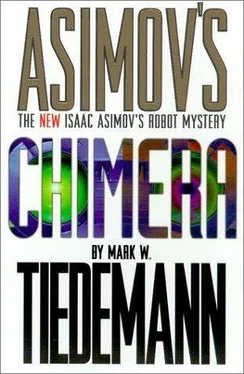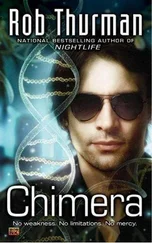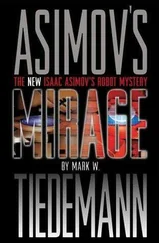Mark Tiedemann - Chimera
Здесь есть возможность читать онлайн «Mark Tiedemann - Chimera» весь текст электронной книги совершенно бесплатно (целиком полную версию без сокращений). В некоторых случаях можно слушать аудио, скачать через торрент в формате fb2 и присутствует краткое содержание. Год выпуска: 2001, ISBN: 2001, Издательство: IBooks, Жанр: Фантастика и фэнтези, на английском языке. Описание произведения, (предисловие) а так же отзывы посетителей доступны на портале библиотеки ЛибКат.
- Название:Chimera
- Автор:
- Издательство:IBooks
- Жанр:
- Год:2001
- ISBN:ISBN: 0-7434-1297-4
- Рейтинг книги:4 / 5. Голосов: 1
-
Избранное:Добавить в избранное
- Отзывы:
-
Ваша оценка:
- 80
- 1
- 2
- 3
- 4
- 5
Chimera: краткое содержание, описание и аннотация
Предлагаем к чтению аннотацию, описание, краткое содержание или предисловие (зависит от того, что написал сам автор книги «Chimera»). Если вы не нашли необходимую информацию о книге — напишите в комментариях, мы постараемся отыскать её.
Chimera — читать онлайн бесплатно полную книгу (весь текст) целиком
Ниже представлен текст книги, разбитый по страницам. Система сохранения места последней прочитанной страницы, позволяет с удобством читать онлайн бесплатно книгу «Chimera», без необходимости каждый раз заново искать на чём Вы остановились. Поставьте закладку, и сможете в любой момент перейти на страницу, на которой закончили чтение.
Интервал:
Закладка:
Mark W. Tiedemann
Chimera
Isaac Asimov's three laws of robotics
1. A robot may not inure a human being, or through inaction, allow a human being to come to harm.
2. A robot must obey the orders given it by human beings except where such orders would conflict with the First Law.
3. A robot must protect its own existence, as long as such protection does not conflict with the First or Second Laws.
For Donna and Henry Tiedemann Mom and Dad with love, respect, and thanks
Prologue
…brief touch, contact with the data port, numbers names dates prognoses, all flow from the brief touch, a tiny surge that feels the way nerves should feel, the stimulation of a hair drawn lightly along a fingertip, but inside, along a conduit less than a hundredth a hair's width, to a smaller place where it grows and explicates and becomes meaningful in translation, revealing location disposition architecture security, an excess of data that gives access, all from a brief touch…
Director Ortalf stopped complaining about the lateness of the hour the instant he saw the hole cut in the wall of the cafeteria at the Seth Canobil Hospice Center, where he worked. His irritation turned quickly to confusion, then embarrassment, and finally fear. He walked up to the opening and reached out to touch the edge, but withdrew his fingers centimeters from brushing the too-smooth cut. In the flat light it shone mirror bright.
"Ah…" he said, looking around. The police officers who had brought him here stood impassively, their faces professionally expressionless. Director Ortalf looked around at the people milling about the area. They moved in groups of threes and fours, some in uniform, most in civilian clothes. Ortalf started at the sight of a drone moving slowly across the floor, its sensors inspecting every centimeter of the tiles.
"Forensic," explained a deep, male voice nearby.
Ortalf looked around. A tall man in somber gray was watching him, his face as ambivalent as everyone else's-except for his eyes, which glistened expectantly.
"Ah," Ortalf said again. "Are you…?"
"Mr. Ortalf, " the man said, ignoring the question. "Director Ortalf."
"Yes?"
"You run this facility?"
Ortalf nodded sharply. "What is going on? Who-?"
"A routine maintenance monitor detected a power outage here," the man explained. "According to its logs, this was listed as a class-B primary site. It attempted to restore the lines, but found irregularities. It then alerted the local authorities. "
"Power outage…but we have a back-up."
"Had."
"Redundant system…had?"
"How many people work here, Director Ortalf?" The man-who must be some sort of inspector, Ortalf surmised-walked away, forcing Ortalf to catch up and walk with him.
"Um…six permanent staff," he said.
The man paused briefly, then continued walking. "I understand you have nearly three thousand wards here. "
Ortalf tried to think. "Your people got me out of bed not even half an hour ago, Inspector. I haven't had time to shower, to get breakfast, to-three thousand? Yes, that sounds about right."
"And only six staff."
"Six permanent staff, I said. We have several interns and part-time volunteers, but even so, almost everything is automated."
They left the cafeteria and started down a long corridor. Emergency lights glowed dimly along the floor and ceiling, even though the regular lights were on.
"Who was on call tonight?" the inspector asked.
"I don't-please, Inspector, what is going on?"
At the end of the corridor a short set of stairs led down into a nurse's station. Banks of screens showed a bright orange STAND BY flashing on them. Ortalf's gnawing apprehension worsened. He moved toward the main console, but the inspector gripped his upper arm tightly.
"Please don't touch anything. Who was on call tonight?"
"I don't remember. Joquil, I think. Yes, Kilif Joquil."
The inspector gestured toward a door that opened at the rear of the station. Ortalf pushed it wide open. Sprawled over the cot that hugged one wall of the cubicle lay a large body, face down.
Ortalf thought for a moment that the man was dead. But a sudden, labored breath heaved through the torso. Dread gave way to impatience.
"What is going on?" the director demanded.
The inspector nodded toward the sleeping male nurse. "Did you know Kilif Joquil used Brethe?"
"What? Now look-"
The inspector aimed a long finger at the nightstand at the head of the cot. Ortalf stared at its contents for a long time before he recognized the inhaler and an unlabeled vial.
"We screen our people carefully," he said weakly.
"I'm sure you do. "
Ortalf looked at the inspector. "Habits can start any time. We scan every six months. "
The nurse shifted in the cot again, then lay still. Ortalf turned and left. The inspector said nothing, just followed, as the director headed for the door to the first ward.
Ortalf stopped at the entrance. The room stretched, nearly a hundred meters on a side, dwarfing the half-dozen or so strangers now wandering the aisles of matreches. Ortalf searched the field of metal and plastic, looking for the telltale difference: a flaw, damage, a sign of disruption. His pulse raced.
"Not this one," the inspector said quietly, just behind him. "Number Five." Ward Five was two levels down. Ortalf's breathing came hard when he reached it. Twice the size of the first-level wards, it contained the same number of matreches. These, however, were larger, more complex. More was demanded of them; the lives within required special care.
Ortalf spotted the damaged units at once. He staggered toward them, dodging down a jagged path between the intact incubators, till he reached the first one.
Sticky fluid covered the floor around it. The shell had been removed and the sac within punctured. Ortalf expected to see an asphyxiated, dehydrated corpse in the bed, but the cradle was empty. The tubes of the support system lay severed and useless on the cushions, a couple of them still oozing liquids. Ortalf made to reach in, but hesitated-touch would tell him the same as sight, that the child was gone. He looked around, confused and close to panic. Nearby he saw two more violated matreches.
"But…but…" He stopped when he found the inspector watching him. "I don't understand," Ortalf said finally.
The inspector came to a conclusion. Concerning what, Ortalf could not be sure, but he recognized the change in the inspector's face, from glassy hardness to near pity. The inspector nodded and gestured for them to return to the administration level.
Ortalf let himself be escorted back, dazed. He barely noticed the people and machines that roamed through his facility. Police, forensic units, specialists-insurance adjustors, too, for all he knew, and within hours the lawyers would be calling.
The inspector brought him to his own office and closed the door.
"What's happened?" Ortalf asked. He had wanted to make it a demand, but it came out as a pale, exhausted gasp.
"I'd frankly hoped you might be able to tell me, Director Ortalf. But…" He sat on the edge of Ortalf's desk and gazed down at him. Some of the hardness had returned, but mixed now with sympathy.
"From what we've been able to reconstruct so far, the entire clinic was severed from outside communications. There was one independent oversight program with a direct line to your maintenance chief, but after ten minutes even that was cut. Most of it went down with the power. You may well have a number of fatalities to deal with. I'm not sure how critical these systems are to each unit-"
"Each matreche has its own power unit to protect from a complete outage. "
Читать дальшеИнтервал:
Закладка:
Похожие книги на «Chimera»
Представляем Вашему вниманию похожие книги на «Chimera» списком для выбора. Мы отобрали схожую по названию и смыслу литературу в надежде предоставить читателям больше вариантов отыскать новые, интересные, ещё непрочитанные произведения.
Обсуждение, отзывы о книге «Chimera» и просто собственные мнения читателей. Оставьте ваши комментарии, напишите, что Вы думаете о произведении, его смысле или главных героях. Укажите что конкретно понравилось, а что нет, и почему Вы так считаете.












